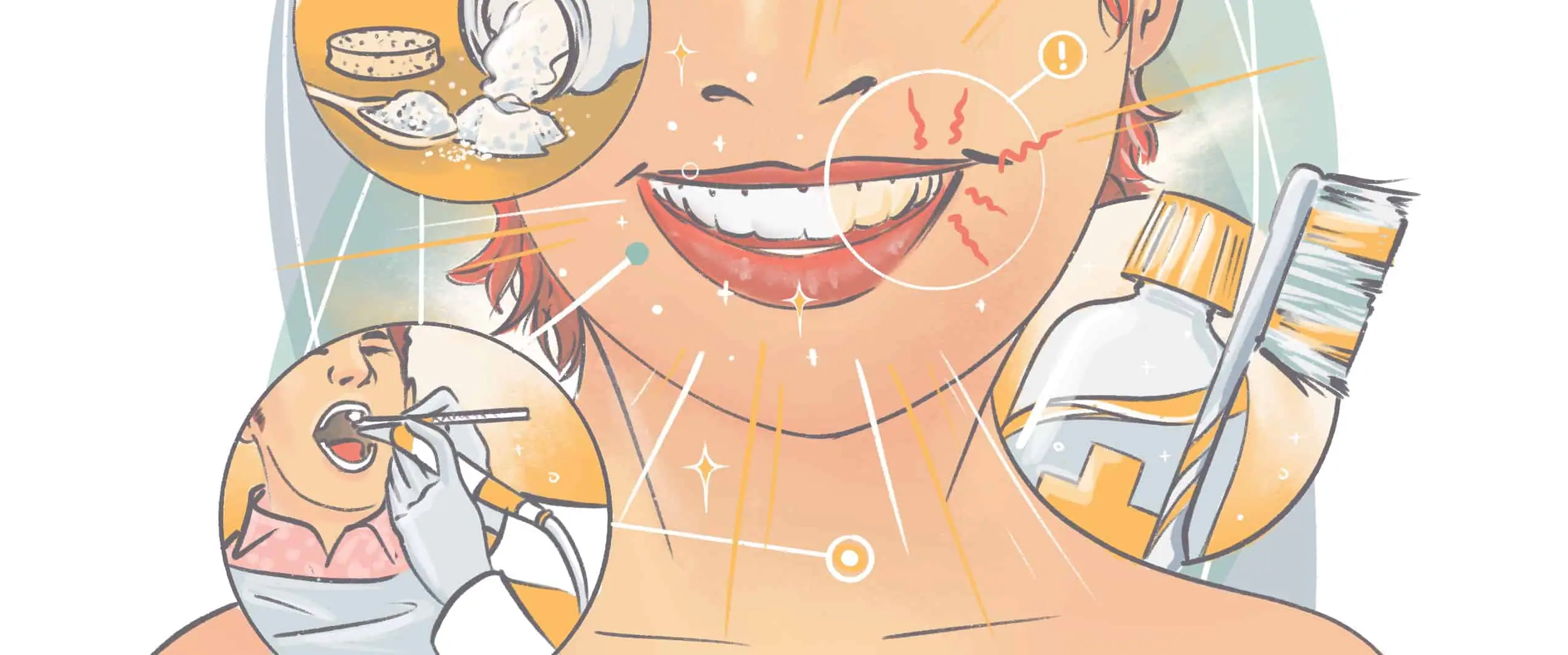Nearly half, 47.2%, of all adults in the US aged 30 years and older have some form of gum disease. This affliction increases with age, causes discomfort, and negatively affects quality of life. Many people struggle with gum diseases such as gingivitis, and we’re inclined to believe there’s no effective solution to this uncomfortable problem. Is there a gingivitis cure? Are there any home remedies we can use to tackle gingivitis? Let’s discuss.
What is gingivitis?
Gingivitis is an inflammation of the gums or gingiva and poses as the earliest stage of gum disease. It is a reversible type of periodontal disease wherein inflammation is limited to the gingival without further destruction of tooth-supporting components. Gingivitis is considered as the second main and commonly occurring oral malady right after caries. This mild form of gum disease affects about 75% of the global population.
The primary culprit behind the development of gingivitis is poor dental hygiene. Inadequate dental hygiene encourages the growth of plaque on teeth and causes inflammation of the gum tissues. Under the gumline, plaque hardens into tartar or calculus which attracts bacteria. As more and more bacteria accumulate and plaque and tartar irritate the gingival, gums become inflamed.
How to recognize gingivitis? The most common signs and symptoms include:
- Tender or puffy gums
- Gums have started receding
- Bad breath
- Gums bleeding when brushing or flossing teeth
Can gingivitis be cured?
To cure or reverse gingivitis, it’s necessary to diagnose gum disease in the early stages and treat it promptly. For that reason, it is crucial to see the dentist regularly, practice dental hygiene, inspect your gums, and pay attention to changes you spot. The dental professional will closely examine your gums and recommend the most suitable treatment.
Due for a checkup?
Find a top rated dentist near you that takes your insurance.
Keep in mind gingivitis cure and reverse depend on early detection. Do not ignore changes in your gums, tenderness, and other symptoms. And most importantly, do not neglect your dental hygiene and a regular dentist appointment.
How can I treat gingivitis at home?
Even though dental professionals are crucial for proper treatment of gingivitis, we also have a lot of options regarding home remedies. Below we’re going to see how to cure gum disease without a dentist and mention useful things you can do at home. Keep in mind, these remedies are not an excuse to ignore the importance of dentist appointments. Let’s start with the basics.
1) Step up your dental hygiene routine
We can’t stress this enough; dental hygiene is crucial for the treatment and prevention of gingivitis. To prevent or reverse gingivitis, brush your teeth twice a day at least, ideally after every meal or snack. Since gums are tender and sensitive at this time, it’s practical to use a soft toothbrush or an electric toothbrush because it’s more effective at removing tartar and plaque. Besides brushing teeth regularly, you also need to floss daily and use mouthwash. Without proper dental hygiene, all other home remedies and strategies won’t work.
You an also use a high-fluoride toothpaste or gingivitis-specific toothpaste (almost all drug stores will provide options for this).
2) Oil pulling
Oil pulling is an ancient remedy people in India have used for centuries to improve dental health. Many cultures have relied on (and still use) oil pulling to whiten teeth, freshen breath, and address problems such as gum disease. Oil pulling involves swishing oil around in the mouth for 20 to 30 minutes. This technique decreases harmful bacteria and eliminates toxins. For example, one study showed oil pulling with coconut oil for 10 minutes a day significantly decreased the number of Streptococcus mutans, one of the main bacteria in the mouth and a crucial player in plaque buildup.
Coconut oil and arimedadi oil are beneficial for the treatment of gingivitis. Coconut oil contains lauric acid, which is known for its antimicrobial and anti-inflammatory properties. Arimedadi oil pulling inhibits the growth of plaque and improves symptoms of gingivitis. To do oil pulling it’s necessary to put one to two teaspoons in the mouth, swish it around, spill it out, rinse the mouth with water, spit the water out, drink a full glass of water, and brush your teeth.
3) Saltwater rinse
Rinsing the mouth with salt water is one of the easiest remedies for gingivitis. Saltwater has disinfectant properties that promote healing. Evidence confirms rinsing the mouth with salt water relieves inflamed gums caused by gingivitis. To use this simple home remedy, combine ¾ tsp of salt in a glass of warm water, swirl the water in the mouth, and spit it out.
4) Turmeric paste
For centuries people have used turmeric as a home remedy for different ailments. This spice can also aid the management of gingivitis thanks to its anti-inflammatory and anti-fungal effects. Besides turmeric gels available in health food stores, it’s also practical to make a turmeric paste to use for gingivitis treatment. To heal inflamed gums, it’s necessary to mix about ½ tsp of turmeric with an equal amount of mustard oil and salt. Apply the paste directly onto the gums and rinse 10 minutes later.
5) Aloe vera
Aloe plants are widely used for medicinal properties. This wonderful plant can also help fight gingivitis and reduce plaque. Simply swish pure aloe vera juice in your mouth for about 30 seconds and spit it out. For best results, use aloe vera two to three times a day.
Give $50, get $50.
Refer someone to book a dentist with Opencare and you’ll both get $50.
6) Baking soda
Brushing teeth and gums with a paste made of baking soda and water can neutralize acids that worsen gum disease. One study compared the effectiveness of toothpaste with and without baking soda in the removal of plaque. They found toothpaste containing baking soda was more effective.
7) Clove paste
Topical treatments can be incredibly helpful for the management of gingivitis. Some examples include clove paste. Clove reduces inflammation and prevents plaque. The process is easy: mince a teaspoon of cloves or use clove oil and dab a cotton ball into it. Then, gently rub clove-covered cotton ball onto the gums and rinse with water a minute later.
8) Homemade mouthwash
What many people don’t know is that they can make their own mouthwash to treat gingivitis. Here are a few examples:
- Lemongrass oil mouthwash: Dilute two to three drops of lemongrass in water, swirl around the mouth and spit it out. Repeat three times a day
- Tea tree oil mouthwash: Add three drops of tea tree oil in a cup of warm water (since tea tree oil can interact with some medications, consult your doctor first).
- Sage mouthwash: Add two tablespoons of fresh or one tablespoon of dried sage to boiling water. Simmer for 10 minutes, strain, and leave to cool.
- Guava leaf mouthwash: Crush six guava leaves and add to one cup of boiling water. Simmer the mixture for 15 minutes and leave to cool.
9) Green tea
Green tea is high in antioxidants that alleviate inflammation and may counteract the body’s inflammatory response to bacteria in the oral cavity. That way, green tea could help relieve swelling and bleeding associated with gingivitis. Polyphenols in green tea could also inhibit the growth of bacteria that lead to gingivitis.
10) Ditch cigarettes and sugar
Cigarettes can irritate your gums and aggravate the accumulation of bacteria. Sugar is also the enemy of healthy gums and teeth. Management of gingivitis also requires lifestyle modifications, including limiting sugar intake and avoiding cigarettes.
What are some over-the-counter products to treat gum infections?
Now that you know how to get rid of gingivitis at home, it’s useful to mention some over-the-counter products that will help you out. You may want to:
- Rinse mouth with antiseptic mouthwash regularly
- Apply gels directly onto the gums (in case of pain)
- Use electric toothbrush
- Use antibacterial toothpaste
Try not to self-medicate. Instead, find a dentist near you and consult them regarding a suitable toothbrush, gel, or mouthwash you can use.
How do dentists treat gingivitis?
A proactive approach and timely treatment are crucial to prevent the progression of this gum disease. If you or a family member struggle with gingivitis, you may want to consider scheduling an appointment in the dental office. Dentists play a major role in the treatment of gingivitis by providing professional dental cleaning, also known as “scale and polish” or “scale and root planing.” During the initial cleaning, a dentist uses tools such as a laser or an ultrasonic device and removes all traces of plaque, tartar, and bacterial residue.
Due for a checkup?
Find a top rated dentist near you that takes your insurance.
The purpose of scaling is to remove tartar and bacteria from tooth surfaces and beneath the gums. On the other hand, root planning aims to eliminate bacterial products that resulted from inflammation. Also, it smooths the surfaces of the roots and discourages the further accumulation of tartar and bacteria from promoting healing.
Some patients may need dental restoration because misaligned teeth or improperly fitting crowns and bridges could irritate the gums. This makes it more difficult to eliminate plaque during a daily dental hygiene routine. For this reason, a dentist may recommend dental restoration. Fixing these problems could make it easier to manage gingivitis.
After proper professional cleaning gingivitis is likely to clear up, but we still need to focus on maintaining dental hygiene every day. A dentist may also help a patient plan an at-home program to keep the gums healthy. Regular checkups can prevent gingivitis and significantly improve dental health. Make sure to see a dentist regularly. Opencare is the best place to find reputable dentists in your area who fits your schedule, needs, and insurance.








